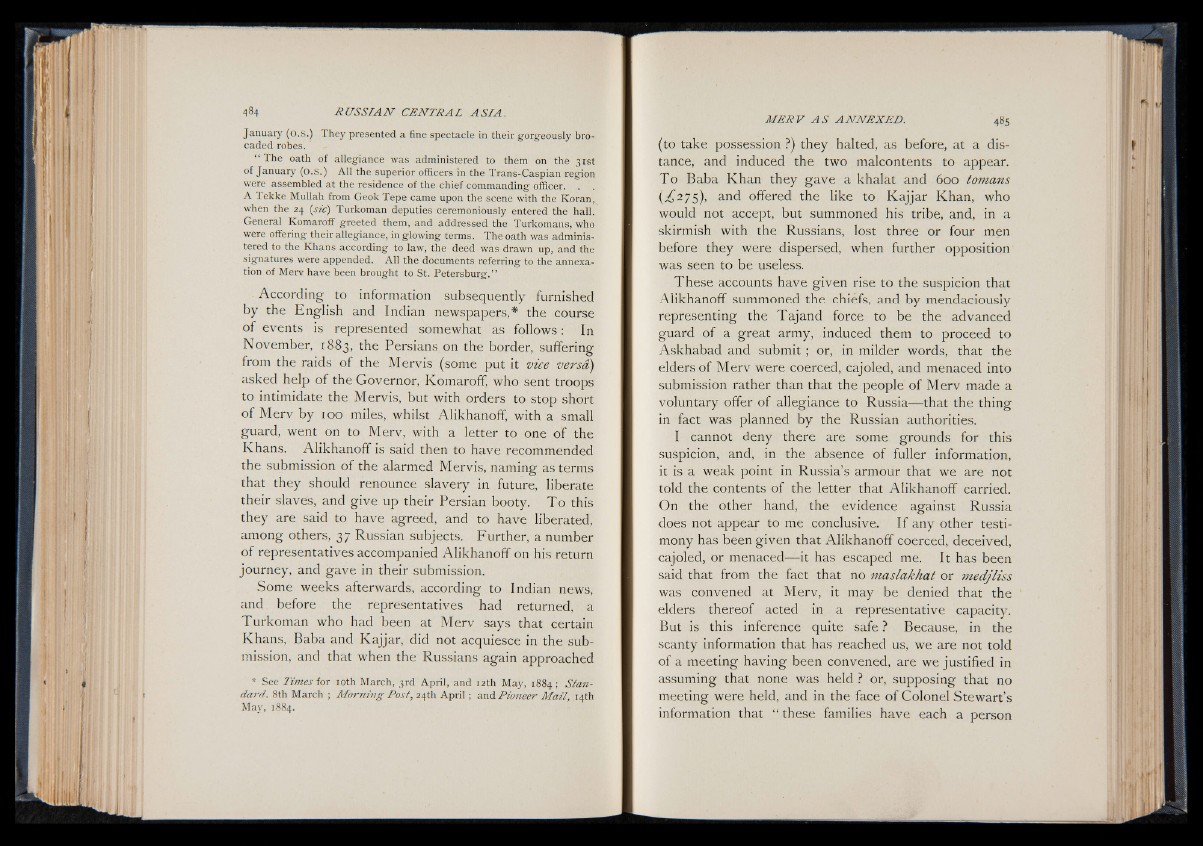
January (o.s.) They presented a fine spectacle in their gorgeously brocaded
robes.
“ The oath of allegiance was administered to them on the 31st
of January (O.S.) All the superior officers in the Trans-Caspian region
were assembled at the residence of the chief commanding officer. . .
A Tekke Mullah from GeokTepe came upon the scene with the Koran,
when the 24 (sic) Turkoman deputies ceremoniously entered the hall.
General Komaroff greeted them, and addressed the Turkomans, who
were offering their allegiance, in glowing terms. The oath was administered
to the Khans according to law, the deed was drawn up, and the
signatures were appended. All the documents referring to the annexation
of Merv have been brought to St. Petersburg.”
According to information subsequently furnished
by the English and Indian newspapers,* the course
of events is represented somewhat as follows: In
November, 1883, the Persians on the border, suffering
from the raids of the Mervis (some put it vice versa)
asked help of the Governor, Komaroff, who sent troops
to intimidate the Mervis, but with orders to stop short
of Merv by 100 miles, whilst Alikhanoff, with a small
guard, went on to Merv, with a letter to one of the
Khans. Alikhanoff is said then to have recommended
the submission of the alarmed Mervis, naming as terms
that they should renounce slavery in future, liberate
their slaves, and give up their Persian booty. T o this
they are said to have agreed, and to have liberated,
among others, 37 Russian subjects. Further, a number
of representatives accompanied Alikhanoff on his return
journey, and gave in their submission.
Some weeks afterwards, according to Indian news,
and before the representatives had returned, a
Turkoman who had been at Merv says that certain
Khans, Baba and Kajjar, did not acquiesce in the submission,
and that when the Russians again approached
* See 1'imes for 10th March, 3rd April, and 12th May, 1884 ; Standard.
8th March ; Morning Post, 24th April; and Pioneer Mail, ,14th
(to take possession ?) they halted, as before, at a distance,
and induced the two malcontents to appear.
T o Baba Khan they gave a khalat and 600 tomans
{£275), and offered the like to Kajjar Khan, who
would not accept, but summoned his tribe, and, in a
skirmish with the Russians, lost three or four men
before they were dispersed, when further opposition
was seen to be useless.
These accounts have given rise to the suspicion that
Alikhanoff summoned the chiefs, and by mendaciously
representing the Tajand force to be the advanced
guard of a great army, induced them to proceed to
Askhabad and submit ; or, in milder words, that the
elders of Merv were coerced, cajoled, and menaced into
submission rather than that the people of Merv made a
voluntary offer of allegiance to Russia— that the thing
in fact was planned by the Russian authorities.
I cannot deny there are some grounds for this
suspicion, and, in the absence of fuller information,
it is a weak point in Russia’s armour that we are not
told the contents of the letter that Alikhanoff carried.
On the other hand, the evidence against Russia
does not appear to me conclusive. If any other testimony
has been given that Alikhanoff coerced, deceived,
cajoled, or menaced— it has escaped me. It has been
said that from the fact that no maslakhat or medjliss
was convened at Merv, it may be denied that the
elders thereof acted in a representative capacity.
But is this inference quite safe ? Because, in the
scanty information that has reached us, we are not told
of a meeting having been convened, are we justified in
assuming that none was held ? or, supposing that no
meeting were held, and in the face of Colonel Stewart’s
information that “ these families have each a person